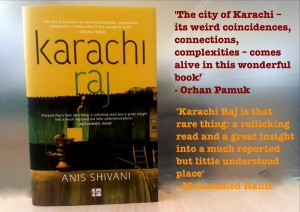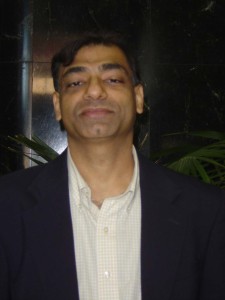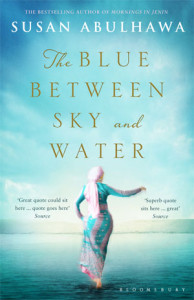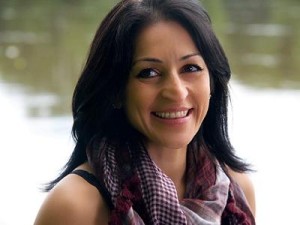Anis Shivani’s “Karachi Raj”
 Anis Shivani has been a writer for many years. He is known as a short story writer and a poet. Karachi Raj is his debut novel. It was nearly ten years in the making. It is about a group of people across social classes who meet. Their lives get intertwined in a manner that is not easily expected in a very class conscious society existing in Pakistan today. Anis Shivani is a critic too. An example of his literary criticism is this splendid three-part essay he wrote for Huffington Post on contemporary American Literature. http://www.huffingtonpost.com/anis-shivani/we-are-all-neoliberals-no_b_7546606.html?ir=India&adsSiteOverride=in ;
Anis Shivani has been a writer for many years. He is known as a short story writer and a poet. Karachi Raj is his debut novel. It was nearly ten years in the making. It is about a group of people across social classes who meet. Their lives get intertwined in a manner that is not easily expected in a very class conscious society existing in Pakistan today. Anis Shivani is a critic too. An example of his literary criticism is this splendid three-part essay he wrote for Huffington Post on contemporary American Literature. http://www.huffingtonpost.com/anis-shivani/we-are-all-neoliberals-no_b_7546606.html?ir=India&adsSiteOverride=in ;
http://www.huffingtonpost.com/anis-shivani/part-ii-the-new-genre-of-_b_7577230.html?ir=India&adsSiteOverride=in ; and
http://www.huffingtonpost.com/anis-shivani/part-iii-the-new-genre-of_b_7606310.html?ir=India&adsSiteOverride=in.
After reading Karachi Raj, Anis and I exchanged a few emails discussing his novel and craftsmanship. With his consent, I am publishing a small portion of the correspondence.
Dear Anis,
Somewhere I get the impression your novel is a response to the “plastic realism” you speak of in contemporary American literature. If that is the case I like it. Karachi Raj without being voyeuristic about poverty or making one cringe with morals, arrives at that fine balance of moving cleverly across socio-economic classes in Karachi. The scenarios represented are plausible making the novel seem “realistic”.
I would love to know how you plot and create your fiction.
JAYA
***
Dear Jaya,
Upon further thought, I think the way you put it in the email below is the best way to express it, better than I did.
You noticed that the book doesn’t give the impression of voyeurism about poverty or make one cringe. The challenge from the beginning was not to write a novel that was sensational or melodramatic or gave you the feeling of unwanted intrusion. Also to avoid the trap of unrelenting misery. It is the dailiness, the ordinariness, the everydaynes of poverty that is the most shocking thing, if you think about it, one doesn’t need to exaggerate or melodramatize it. In early drafts I did have a bit of a problem with melodrama, but I got over it quickly. To do that I had to be honest with myself as to what the characters were all about; if I could be true to them, then I could avoid melodrama and sensationalism. Even the poorest people don’t unrelentingly face violence and tyranny all the time, most of life is drudgery and going on with one’s business as best as one can. And humor is a big part of how one handles problems for which there is no easy solution, certainly I do that, and so humor is a critical part of the novel. In all these ways, the novel begins to feel plausible.
I should also give a lot of credit to my editor at HarperCollins, Manasi Subramaniam, who labored hard to help me get rid of all the exposition that was getting in the way of the fluid telling of the story. That made a huge difference. You need to be under a dream spell when you read a novel and whatever interferes with that–such as any unnecessary exposition–is going to disrupt the spell and take you out of the story and make it less believable, so we worked ruthlessly on that.
You asked about how I plot and create fiction. I would say that there are certain fundamental issues that have bothered me my whole life and continue to do so, and that’s the deep wellspring of my fiction. Once I’m exercised enough about a problem, then I start localizing it in a time and place, and then finally the characters emerge, which is the trigger point for the story and it takes off from there. For Karachi Raj, there was no particular point where I said to myself, Oh, I’m going to write a novel about the Basti, so let me research everything about that, then when I’ve got the research done, I’ll write the novel. It doesn’t work like that.
What I can say is that the idea that hundreds of millions of people should live in dire poverty in the Indian subcontinent seems like the ultimately unforgivable issue to me. Part of it is that people believe in ideologies that go against their self-interest, certainly their economic self-interest. That’s the case with Pakistan, and when it comes to the so-called Pakistan Ideology, it’s in the background of the novel, though I’m not didactic about it. In the West too people are always electing political parties that go against their self-interest, the working class keeps voting in conservative, even fascist, parties. People everywhere seem very keen to give up freedom, and the thing that motivates me more than anything is unrestrained freedom, without any rules, any rituals, any constraints on freedom of action. And the problem of poverty also goes back in large part to the problem of freedom.
Anyway, once I have a general interest like this then there has to be a setting that needs to become very clear to me, as the realm in which to explore the general problem, and once I have the setting down–in this case I had to imagine the Basti in very concrete terms–then the characters come, and once I have the characters then the plot is the final element. If I’ve conceptualized the characters well, then the plot will just flow; to the extent that there’s trouble executing the plot, it means there’s a problem with characterization, so I have to go back to that and fix it.
Anis
Anis Shivani Karachi Raj HarperCollins Publishers, Fourth Estate, New Delhi, 2015. Hb. pp. 410 Rs.699


